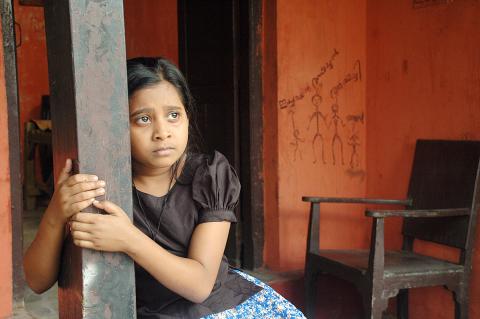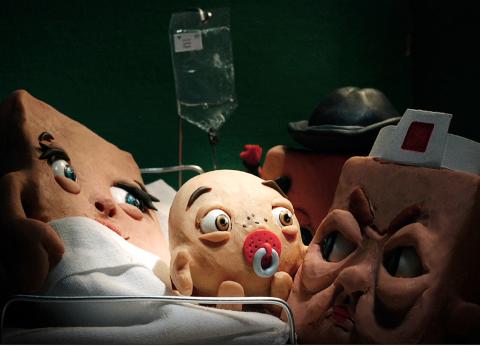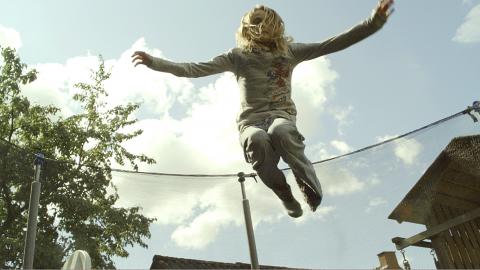With a diverse lineup of 89 fictional, animation, documentary and short films, as well as television programs, selected from 27 countries, the 2012 Taiwan International Children’s Film Festival (台灣國際兒童影展) opened on Thursday.
Initiated in 2004 by Public Television Service, the biennial film showcase, which runs through April 5, presents its target demographic, children aged under 12, with multicultural spectacles and varied points of view.
This year’s theme is “fear and courage,” and deals with the obstacles and predicaments youngsters face and the ways they find of coping with them.

Photo courtesy of Public Television Service
The impact of divorce, for example, is seen through the imagination of a child in The Little Boy and the Beast, a multi-award-winning animated short from Germany in which a boy’s divorced parents turn into hairy beasts.
The topic of sexual identity is tackled in documentaries I Am a Girl! from Netherlands, in which 14-year-old Joppe, born a boy but convinced he is a girl, puts on makeup, talks about her crush on boys and hormone treatments, and Taiwan’s Vincent (小文的心事), a humorous portrait of a nine-year-old ballet dancer who believes his masculinity is being threatened by the “girlish” dancewear he wears.
Children with rare disorders take center stage in Flying Anne, which tells the heartwarming story of 11-year-old Anne, who has Tourette’s syndrome and learns to live with her “tics.”

Photo courtesy of Public Television Service
Meanwhile, the specter of violence hovers over a group of boys in The Colors of the Mountain. Set in a remote Colombian village near the border with Panama, the multi-award-winning film follows the boys as they try to retrieve a football from a minefield.
Jessie Shih, the festival’s deputy convener, said this year’s schedule includes programs specially devised to cultivate various skills.
Science seems to be a favorite among Taiwanese parents as the works in the Magic Science segment, which include the Discover Science series produced by Japan’s NHK, were among the first to sell out.

Photo courtesy of Public Television Service
In the festival’s Touching Feelings segment, the ability to empathize is underscored through films such as The Lost Thing, an Oscar-winning animated short that examines what it feels like to be an outsider.
Last but not the least, the festival’s Kids as Directors program sees children from Taiwan, Singapore, India, Belgium, Portugal and the UK take over the filmmaking process.
Notable movies in the lineup are The Savage, which follows an HIV positive Indian girl, whose parents and siblings died of AIDS, as she endures daily insults from neighbors and strangers, and Our Everyday Lives: Chennai, Nomadic Community, which was made by members of a nomadic community to shine a light on their often misunderstood lives.

Photo courtesy of Public Television Service
Moving closer to home, more than 20 elementary students and their teachers at a Kinmen school teamed up to create the cutout animation Chinese White Dolphins’ Fighting for the Oceans (白海豚之海洋保衛戰), which raises awareness of the plight of the endangered local dolphin population and marine conservation efforts.
For screening times and more information, visit the festival’s bilingual site at www.ticff.org.tw.


Earlier this month Economic Affairs Minister Kuo Jyh-huei (郭智輝) proposed buying green power from the Philippines and shipping it to Taiwan, in remarks made during a legislative hearing. Because this is an eminently reasonable and useful proposal, it was immediately criticized by the Chinese Nationalist Party (KMT) and Taiwan People’s Party (TPP). KMT Legislator Chang Chia-chun (張嘉郡) said that Taiwan pays NT$40 billion annually to fix cables, while TPP heavyweight Huang Kuo-chang (黃國昌) complained that Kuo wanted to draw public attention away from Taiwan’s renewable energy ratio. Considering the legal troubles currently inundating the TPP, one would think Huang would

Taipei Mayor Chiang Wan-an (將萬安) last week told residents to avoid wearing scary Halloween costumes on the MRT so as not to alarm other passengers. Well, I thought, so much for my plan to visit Taipei dressed as the National Development Council’s (NDC) biennial population report “Population Projections for the Republic of China (Taiwan): 2024-2070,” which came out last week. Terms like “low birth rate” and “demographic decline” do not cut it — the report is nothing short of a demographic disaster. Yet, in Taiwan, as in other countries, it is solvable. It simply requires a change in mindset. As it

One of BaLiwakes’ best known songs, Penanwang (Puyuma King), contains Puyuma-language lyrics written in Japanese syllabaries, set to the tune of Stephen Foster’s Old Black Joe. Penned around 1964, the words praise the Qing Dynasty-era indigenous leader Paliday not for his heroic deeds, but his willingness to adopt higher-yield Han farming practices and build new roads connecting to the outside world. “BaLiwakes lived through several upheavals in regime, language and environment. It truly required the courage and wisdom of the Puyuma King in order to maintain his ties to his traditions while facing the future,” writes Tsai Pei-han (蔡佩含) in

Chiayi County is blessed with several worthwhile upland trails, not all of which I’ve hiked. A few weeks ago, I finally got around to tackling Tanghu Historic Trail (塘湖古道), a short but unusually steep route in Jhuci Township (竹崎). According to the Web site of the Alishan National Scenic Area (阿里山國家風景區), the path climbs from 308m above sea level to an elevation of 770m in just 1.58km, an average gradient of 29 percent. And unless you arrange for someone to bring you to the starting point and collect you at the other end, there’s no way to avoid a significant amount